| Srl | Item |
| 1 |
ID:
151833
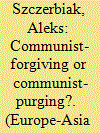

|
|
|
|
|
| Summary/Abstract |
While Poles generally supported a radical approach towards truth revelation, on its own the issue did not appear to be especially salient. Poles wanted to move on from debates about the communist past and felt that the process of achieving transitional justice was a potentially destructive one. However, they also felt that they had a right to know about the past of their political elites and that collaboration with the communist security services was an especially reprehensible form of pro-regime activity. Moreover, in the public mind truth revelation was often considered in conjunction with other, more salient issues.
|
|
|
|
|
|
|
|
|
|
|
|
|
|
|
|
| 2 |
ID:
151827
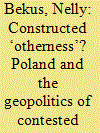

|
|
|
|
|
| Summary/Abstract |
The rise of Belarus to political independence has required it to delineate its cultural boundaries in-between two ‘Others’—Poland and Russia. This essay explores a range of portrayals of Poland in Belarusian cultural artefacts, including television programmes, film, novels, and theatre performances—from the image of an ‘Other’ that threatens Belarusian identity, to the main ally supporting the European choice of Belarusians. Examples from Belarusian cultural texts analysed in the essay show how representations of Poland are grounded in selective and ideologically driven interpretations of Belarus’s own past, while their coexistence reveals the contested nature of the geopolitics of Belarusian identity.
|
|
|
|
|
|
|
|
|
|
|
|
|
|
|
|
| 3 |
ID:
151826


|
|
|
|
|
| Summary/Abstract |
‘Europe’ has long been an essential marker in Ukrainian public discourse. Its significance was strikingly apparent during the Euromaidan protests, with the very name reflecting the movement’s ‘European aspirations’. Europe has been associated with polarisation in Ukrainian political debates on national identity and foreign policy. Nevertheless, Europe evolved as a normative model in Ukrainian public discourse throughout the 1990s and 2000s. This essay argues that the normative model of Europe was particularly reinforced by the mediatised discourse of Ukrainian political elites in the years before Euromaidan. Critical discourse analysis of popular Ukrainian talk shows is presented as evidence.
|
|
|
|
|
|
|
|
|
|
|
|
|
|
|
|
| 4 |
ID:
151830
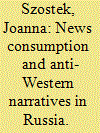

|
|
|
|
|
| Summary/Abstract |
This essay investigates the relationship between habits of news consumption and geographical imaginations in Russia. It uses results from a survey of students at a Moscow university to demonstrate an association between the news sources used by respondents and their acceptance of the Russian authorities’ narrative about the West. Students who used at least one state-aligned news source were inclined to express greater agreement with the official (negative) narrative about the West than students who did not use any state-aligned news sources. However, some of the Russian authorities’ anti-Western claims resonated strongly even amongst the non-users of state-aligned sources.
|
|
|
|
|
|
|
|
|
|
|
|
|
|
|
|
| 5 |
ID:
151832


|
|
|
|
|
| Summary/Abstract |
Treating popular geopolitics as an interdisciplinary environment, this essay interrogates the viability of employing popular geopolitics as a tool for understanding the relationship between the popular and the political on the international stage as it relates to the Russian Federation. Using several representative artefacts of pop-culture and their reception, we attempt to demonstrate that a powerful trans-regional feedback loop has been established, wherein Russian and ‘Western’ currents feed into and off of each other. These flows sustain older geopolitical codes and frames, while steadily developing new patterns and dimensions of exchange that ‘explain’ variations triggered by the vagaries of globalisation.
|
|
|
|
|
|
|
|
|
|
|
|
|
|
|
|
| 6 |
ID:
151824
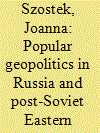

|
|
|
|
|
| Summary/Abstract |
Popular geopolitics refers to a subfield of Human Geography concerned with peoples’ perceptions of different parts of the world and how those perceptions are (re)produced in popular culture. It addresses how certain representations of international politics are embedded and promulgated in mass media, including cartoons, comics, movies, video games, newspapers and magazines. Audience engagements with geopolitical narratives in the media are part of this focus of study.
|
|
|
|
|
|
|
|
|
|
|
|
|
|
|
|
| 7 |
ID:
151825
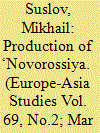

|
|
|
|
|
| Summary/Abstract |
The essay inquires into the cultural production of ‘Novorossiya’ as a politically-coloured territorial ‘brand’, promoted by pro-Kremlin intellectuals, activists of the Donbas rebellion, and internet users. It argues that ‘Novorossiya’ is not only constructed from the building blocks of historical traditions, but also framed by geographical metaphors in popular imagination. Drawing on studies in critical geopolitics and fan fiction, this research interprets ‘Novorossiya’s’ constituency in the Russian-language internet as a sort of political ‘fandom’. Relative to the annexation of Crimea, however, this ‘brand’ has been less successful on the ‘market’ of geopolitical projects.
|
|
|
|
|
|
|
|
|
|
|
|
|
|
|
|
| 8 |
ID:
151829


|
|
|
|
|
| Summary/Abstract |
This essay presents findings from 136 in-depth interviews conducted amongst students at three leading Russian universities. Qualitative analysis revealed a three-way divide in how the students imagined Russia’s future. The largest group is optimistic about Russia, seeing it as a global power. A second, smaller group expects Russia to decline in the coming years, while the third group is undecided and unwilling to make forecasts. The essay considers the arguments of the ‘optimists’ and ‘pessimists’, who respectively backed and criticised the annexation of Crimea. The essay highlights the association between support for the annexation and optimism about Russia’s future.
|
|
|
|
|
|
|
|
|
|
|
|
|
|
|
|
| 9 |
ID:
151835
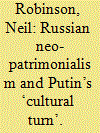

|
|
|
|
|
| Summary/Abstract |
Russian politics has been characterised by increasing cultural and political conservatism since Vladimir Putin’s return to the presidency. This article argues that Putin’s turn to cultural conservatism is a reaction to a crisis in Russia’s neo-patrimonial system. The article presents a model of neo-patrimonialism and argues that the turn to cultural conservatism under Putin is only a partial solution to the problems of neo-patrimonialism in Russia. This is because the turn towards cultural conservatism does not define any internal transformational tasks for Putin to fulfil.
|
|
|
|
|
|
|
|
|
|
|
|
|
|
|
|